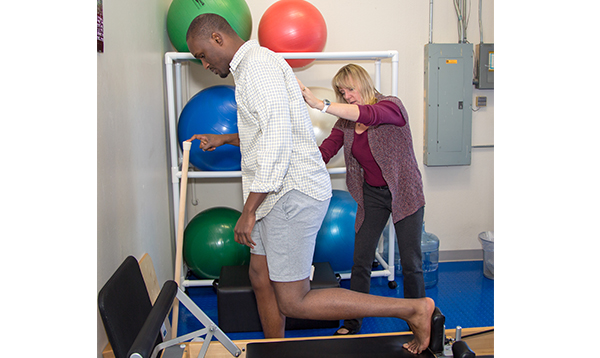Pain In The Front of the Knee
“I have pain in the front of my knee, most during descending stairs and sometimes with prolonged sitting. What might be the problem?”
Anterior knee pain refers to any type of pain that affects the front of the knee, around the area of the knee cap. Anterior knee pain can be indicative of many different problems. Patellar tendonitis, patella femoral syndrome, and chondromalacia are the three most common causes.
1. Patellar tendonitis also known as “jumper’s knee” or “runner’s knee”
This is an injury to the tendon that attaches the patella (knee cap) to the tibia (lower leg). It is a very strong, thick tendon but can be damaged by overuse/over training. Precipitators include: running in poor shoe wear, doing a long hike after a period of no activity, ramping up mileage too fast while training for a run, excessive jumping, or direct trauma to the tendon.
2. Patellar femoral syndrome also know as maltracking of the patella
This is mechanical problem at some level in the kinetic chain (any part from you foot to your hip, to your back) that is interrupting the normal mechanics of the knee cap as it “rides on the femur (thigh bone). This inefficiency in biomechanics results in irritation and some wearing down of the joint surface causing pain as the knee cap grinds on areas that are sensitive.
3. Chondromalacia patella
This syndrome is generally diagnosed when it is believed that there is a softening and possible fissuring in the cartilage that lines the patella therefore compromising its ability to absorb shock and pressure. This is often diagnosed in teenage women. It causes pain primarily after prolonged sitting or desceding stairs.
“What should I do?”
Patella tendonitis: If caught early, patella tendonitis can resolve easily. It is best to begin icing the area 2-3 times per day. (see The Ice Sheet) You may also need to reduce the aggravating activity for 2-3 weeks. You must rest all together if you are feeling the pain on a continual basis! If you only have pain after prolonged activity, you should reduce it at least 25% for 2-3 weeks. This will stop the inflammatory cycle and allow healing to take place.
You will need to examine your shoes/sneakers and make sure they are in good condition and appropriate for the type of sport you are doing. (E.g. Squash shoes DO NOT make good running shoes.)
You will need to begin a good stretching routine most especially stretch the calves and soleus as well as the hamstrings, quads, and psoas.
Strengthening the gluts (butt) and quads (thigh muscles) will also help.
If symptoms persist greater than 2 weeks you may want to see a physical therapist, who can asses your biomechanics, show you some taping techniques, treat the damaged tissue, and shoe you preventative exercises.
Patellar femoral syndrome: This problem is slightly more complex than tendonitis. You should ice 2-3times per day. You should also check your shoes/sneakers and make sure they are not too worn out and are appropriate for your foot type.
Stretching is very important in this situation, especially for the hamstrings, calves, and gluts (butt).
Strengthening the gluts (butt) is critical here.
A physical therapist can help asses your biomechanics and strength deficits and give you a program. Taping techniques can be quite effective in the short term. You may also be a candidate for orthotics if foot mechanics are found to be a contributor. A physical therapist can also make these for you.
Chondromalacia patella:
Fortunately, many people can improve symptoms dramatically through appropriate strengthening. You need to strengthen all the areas of the lower extremity including the gluts, quads, hamstrings and calves as well and your core stabilizers (abdominals, paraspinals and gluts) in small increments without doing deep knee squats.
Orthotics may also help in this situation. A physical therapist can asses this need and fabricate them for you if needed.


0 Comments